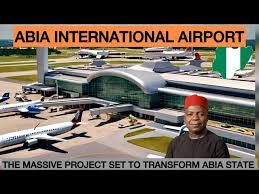A brewing crisis threatens to derail the much-anticipated construction of the Abia State Airport, scheduled to commence tomorrow, Tuesday, December 17, 2024.
Nsulu communities, the proposed location for the project in Isiala Ngwa North Local Government Area, have vehemently rejected the government’s choice of site, claiming it will lead to the displacement and potential extinction of several agrarian communities and the seizure of their ancestral lands.
While the Abia State Government, via Chief Press Secretary Ukoha Njoku Ukoha, announced the December 17th groundbreaking ceremony, to be officiated by the Minister of Aviation and Aerospace Development, Festus Keyamo, SAN, the communities are mounting fierce opposition.
Their concerns, voiced through community leaders like Engineer Ikechukwu Uche from Umuezeukwu, center on a perceived lack of consultation and the devastating impact on their livelihoods.
“We are not against the airport,” Uche stated, “but the government’s insistence on this location is unacceptable. This land is our source of livelihood. To build here means taking our ancestral farmlands, displacing us, and essentially driving us to extinction.”
“Communities like Umuezeukwu, Umuala, Umuezenta, and Umuosu, all agrarian communities, will be wiped out,” Uche continued.
The communities’ outrage stems from what they describe as the government’s unilateral decision-making. They allege that despite the extensive land mass required for the project, there has been no meaningful engagement with the affected communities.
“They came, mapped, surveyed, damaged our crops, and left without a single serious conversation or negotiation,” Uche added.
“The sheer scale of land appropriation raises questions about the true nature of this project – is it truly an airport, or simply a land-grabbing exercise?”
The communities’ concerns are further amplified by the government’s announcement of the project’s commencement date before key details, such as the airport model, required land area, and environmental impact assessment report, have been released.
This lack of transparency, coupled with what they perceive as intimidation tactics, has fueled their protests. “No compensation will ever be enough to assuage the collateral damage,” Uche asserted.
The communities are now calling on Minister Keyamo to intervene and prevent the commencement of construction on the proposed site.
They are urging him not to lend his support to what they consider an illegal and forceful land acquisition.
Their plea is for the government to reconsider the location, utilizing the previously mapped-out site as proposed by the previous administration, a suggestion that’s been consistently ignored by the current government.
Meanwhile, the Abia State Government maintains that extensive engagement has taken place with the communities. Chief of Staff Pastor Caleb Ajagba claimed that concerns were addressed and widespread support secured.
He assured adequate compensation for landowners and the preservation of livelihoods. The government cites a partnership with the Federal Government, secured in July 2024, and significant private sector involvement from Access Bank, as evidence of the project’s viability and economic benefits for the state.
A Federal Government delegation, including representatives from FAAN, NIMET, NCAA, and NAMA, even visited the proposed site.
However, the stark contrast between the government’s assurances and the communities’ desperate plea underscores a significant rift.
The impending December 17th groundbreaking ceremony is now overshadowed by this escalating conflict, casting doubt on the project’s smooth commencement and raising serious questions about the government’s approach to community engagement and land acquisition.

